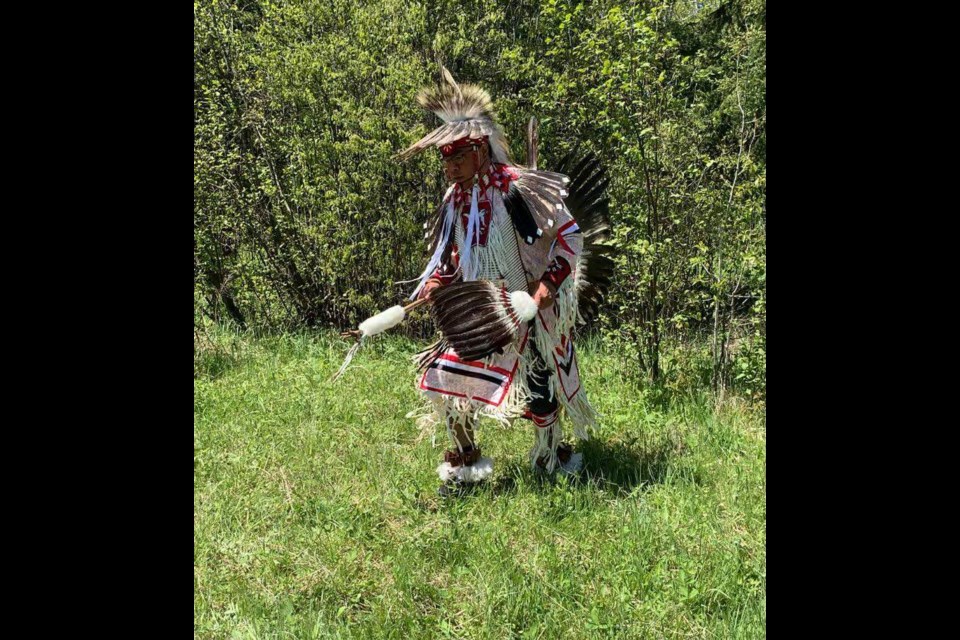Charlie Kioki's determination to dance again and to be there for his children allowed him to get back on his feet quite quickly after losing his leg below the knee.
Kioki, 45, is a traditional men’s dancer, singer, drummer and crafter from Attawapiskat First Nation. He now lives in Timmins and works underground in a mine.
Being a men’s traditional dancer has been a big part of his life and it healed him in many ways, he says.
In May 2020, he lost a left leg below the knee due to a chemical infection. The incident left him depressed as he thought he would never dance again.
In November, he started dancing and in December, he learned how to skate all over again.
Kioki says he didn’t want to be sitting in a wheelchair for the rest of his life. To heal, he also had to change the way he ate — he switched to a plant-based diet — and he started going to the gym to get stronger.
He was determined to get back to work, look after his kids and start dancing again.
“I was so thankful for what I was capable of doing again. To dance again was overwhelming and emotional at the same time,” he says. “It’s been a blessing every step of the way.”
If he had to do it all over again, he would, Kioki says.
Kioki started as a grass dancer at the age of 15. Since then, he’s travelled across Canada and the United States attending traditional powwows and competition powwows.
The reason he switched to men’s traditional dance was because of the feeling while wearing regalia with the bustle and the feathers.
“It felt right at the place for me,” he says.
Kioki has held a variety of jobs throughout his life.
Back home in Attawapiskat, Kioki worked as a band representative for child welfare. At the Timmins Native Friendship Centre he was a family support assistant running a daycare and taught Cree classes. He also worked as a Cree translator in the Timmins court a few times.
Kioki says he also has a side business doing construction, renovations and plumbing gigs.
The work in mining was supposed to be a temporary job but 11 years later, he’s still at it. The money is good in mining, Kioki says, but the real bonus is working half of the year, so he can spend his time off with his children or doing his hobbies that include sewing, beading, singing, teaching and dancing.
“Money is always going to be there, it comes and goes. I’m not stressed,” he says. “I can have no money, have food in the house and be the happiest guy in the world because I have my kids.”
He learned how to sew in one of the home economics classes at a Timmins high school and he hasn’t stopped ever since. With two sewing machines at home, he makes moccasins, quilts, blankets, regalia, clothing apparel as well as beadwork.
When he works on regalias, he puts consideration into what colours and designs to use as they have meaning. Kioki even once made a wedding dress for his friend 10 years ago.
Helping the younger generation is something Kioki is interested in and he’s thinking of going back to social work. He also wants to open a store where he can sell beads and crafts.
He says he tries to spend as much time with his children as he can. He takes pride in being a father and he says that’s what he’s good at.
It’s not what you buy your children but it’s time you make for them that will last for a lifetime, he says.
His own childhood was “awesome" thanks to his parents raising him with kindness and teaching how to live off the land, hunt, fish and trap.
“We weren’t rich, we were barely getting by but we were millionaires in love. Sharing love, having love in the family,” he says. “We had food in our mouth and we were always happy and that’s all that mattered.”
Kioki says he could never live up to his father’s legacy but he does his best as a father to be there for his children.
“Even if it’s to play with my little girl with dolls for five minutes, I’ll take that five minutes and play with her,” he says.



